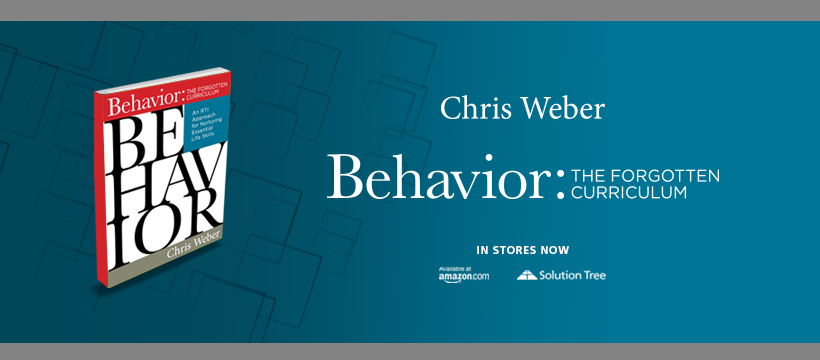Based on Behavior: The Forgotten Curriculum
Parent involvement and support from home—or the lack thereof—is a consistent conversation at schools across the country and across the world.
Here are a few “truths” that we have accepted:
- Almost all parents are doing the best they can.
- Almost all parents are doing what they think they should be doing and what they know to do.
- If we want parents to do differently and do more, we need to take the lead on communicating the important elements of a more powerful partnership; as is so often the case, we are the answer we’ve been waiting for.
The Current Connection with Parents
Unfortunately, and too often, our interactions about and with parents are limited to the following:
Shaming and Blaming
Wishing, hoping, and wringing our hands about what we wish parents would do and what parents should be doing may be cathartic in the short term, but it is unempowering and unprofessional. Both intellectually and emotionally, we know that families are in various states of “just getting by.” Empathy demands that we respect, love, honor, and accept our families for who and where they are. They would do anything for their children. Perhaps our questions ought to be, “What can they do? What do we most want them to do? How do we support them in doing it?” Let’s ask these questions with high expectations and a pragmatic respect for reality. There’s a good chance parents aren’t crystal clear on what they should do. There’s a good chance we haven’t been quite as clear and comprehensive in our communications and requests as we could be.
Homework
We should never assign a homework assignment unless we have evidence that the homework can be completed successfully and independently. When homework is too long, difficult to understand, or requires parents to provide assistance that they may not have the time or specific strategies to provide, we put parents in an impossible situation. I’m committed to supporting my children in their homework; all parents are. And yet the manner in which we have assigned homework seems all but guaranteed to put parents at a disadvantage and on the defensive.
Back-to-School Nights and Open Houses
Both of these are wonderful opportunities to celebrate our schools, students, families, communities, and educators. But perhaps we can rethink their purpose and format. Maybe these two events are insufficient to nurture the partnerships we need and desire. I have observed schools making significant shifts in these experiences for parents. I challenge us to continue to make these shifts and to increase the quantity of these events and partnerships with parents.
Best Practices for Involving Parents
There is good research and plenty of evidence-based practices that provide guidance on the best ways to partner with parents and communities. Let’s take a look a few.
Ron Edmonds, Larry Lezotte, and the Correlates of Effective Schools
The Correlates of Effective Schools and the Effective Schools Movement were, and remain, two of the most important contributions to public education in the United States. A complete summary of the genesis of the movement and the development of the correlates deserves its own book. Several of the correlates relate to parent partnerships. The seven correlates represent characteristics of schools that significantly outperform other schools serving similar communities:
- Clear School Mission: Parents should be and can be contributors to creating and promoting this mission.
- High Expectations for Success: Parents need to know what is meant by high expectations—with what tasks do students engage? What do students produce? What do students know?
- Instructional Leadership: School principals and leaders clearly, consistently, and passionately communicate best practices and the sense of urgency for high levels of learning for all to all stakeholders, including parents.
- Frequent and Appropriate Monitoring of Student Progress: Parents deserve to know where their students currently are in their learning journey and where they need to be, beyond a letter grade.
- Opportunity to Learn and Student Time on Task: Parents can be supporters of the necessary shifts in what students are doing and how they’re doing it in classrooms, when they understand that classrooms may not look the same as when they were in school and why.
- Safe, Orderly, and Productive Environment: Parents should be key contributors to a school’s system of behavioral supports and to the behavioral expectations the school establishes. The reinforcements of safe, orderly, and productive environments cannot be something that parents feel is being done to their students; instead, parents can understand the positive and productive reinforcement of behavioral skills to be feedback in the development of essential nonacademic skills.
- Positive Home-School Relations: This correlate speaks for itself. Exceptional schools enjoy positive home-school relations.
Michael Fullan and Community Involvement
In The New Meaning of Educational Change, Michael Fullan examines the role of parent involvement in schools:
“Teachers cannot do it alone. Parents and other community members are crucial and largely untapped resources who have (or can be helped to have) assets and expertise that are essential to the partnership…parents are their children’s very first educators. They have knowledge of their children that is not available to anyone else. They have a vested and committed interest in their children’s success, and they also have valuable knowledge and skills to contribute that spring from their interests, hobbies, occupations, and place in the community.”
Fullan is suggesting schools in which educators learn from and with parents in their service of students and learning.
Eric Jensen and Family Engagement
In Teaching Students with Poverty in Mind and Engaging Students with Poverty in Mind, Eric Jensen summarizes the research and promotes a model that parent education and empowerment is a foundational element of combatting the effects of socioeconomic challenges: “Researchers concluded that many of the factors of low socioeconomic status that negatively affect student academic success could be overcome by better educating parents about these essential needs.” Significantly involving parents, providing supports to parents and families (in school-based areas and beyond, such as medical care), reaching out to families in their homes, and building strong relationships with parents are highly correlated with improved student outcomes.
Anthony Muhammad and Luis Cruz and Involving Parents in the Educational Process
Both of these school culture and school excellence experts have led buildings and supported hundreds or other schools that have achieved remarkable gains in student achievement; parents have been a foundational contributor to these schools’ achievement. From parent universities to staff serving as parent liaisons to parent volunteers to the active involvement of parents in student governance, Anthony Muhammad and Luis Cruz make an airtight case for the transformational impacts of parent involvement.
Examples of Strong Parent Partnerships
There are hundreds of examples of successes from schools and school districts. Here are just a few.
Parents as Interventionists
Talman Elementary School, a K–8 school in Chicago’s Pilsen neighborhood, is one of Chicago Public Schools’ most creative and successful. Principal Jackie Medina invited me to hear from staff about their systems of supports that have led to record-setting achievement. It took me 20 minutes of talking with and learning from a group of adults to learn that the group was composed entirely of parents. Parent tutors are ever-present in the hallways and classrooms. They significantly lower adult-student ratios and provide interventions to students for which there is undeniable evidence of success. This parent network is self-sustaining; after years of practice and success, parents teach and empower the next generation of parents every year.
Surveying and Responding to Parent Needs in Garden Grove Unified School District
Garden Grove USD’s parent partnership has long been a key to the success of this award-winning district; they were early implementers of the 10 Educational Commandments described below. Now, as part of the district’s comprehensive and cutting-edge commitment to college and career readiness for all, parents are extensively surveyed for their opinions and experiences. These evidence points are as important to all educators in the district as grades and test scores, and they directly shape continuous-improvement efforts.
Orange County Business Council’s 10 Educational Commandments for Parents
In partnership with the Latino Educational Attainment Initiative, the 10 Educational Commandments for Parents are:
- Commit as a family to be involved in school
- Do my part in helping my child study
- Understand how grades work
- Learn how schools are structured
- Learn what my child needs to graduate successfully from high school
- Support the learning of mathematics, science, and English
- Encourage my child to take honors and advanced courses
- Help my child prepare to be college and/or career ready
- College options are affordable
- Teach my child to be creative, to communicate, and to view challenges as opportunities
This may be the most remarkable parent-empowerment initiative I’ve ever encountered. Guided by parents for parents, this program doesn’t simply expect parents to embrace and practice the commandments; parents learn the why, what, and how represented by each commandment. In combination with educators within schools and districts that embrace and support the Commandments, parents are empowered to significantly and actively contribute to their children’s educational lives.
We know the need. We know what to do. The question is whether we have the will to support our parents so they are even better able to support their students. How do we get parents more involved in their child’s education? We are the answer we’ve been waiting for.[author_bio id=”77″]







Hi Chris!
This article is perfect for a discussion with my staff. How can I get permission to share it with them?
Dear Karen,
Glad this post was helpful! You should feel free to share this article as long as you are not using it for monetary gain or re-posting it online. The easiest way to share would be to send them the URL, but please cite the source if you share it in another way.